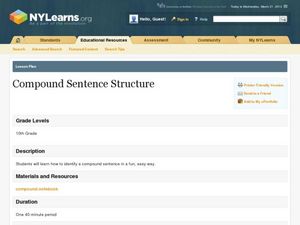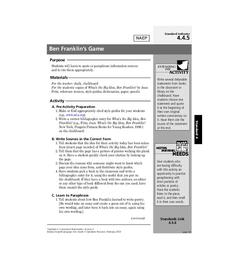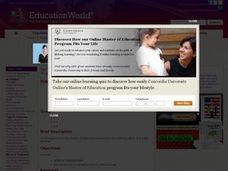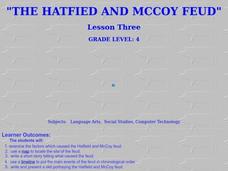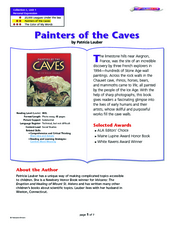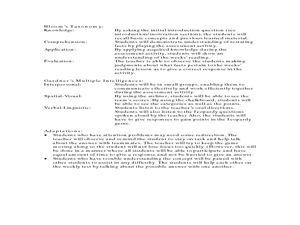Curated OER
Test Your Speaking & Listening Skills: Class Survey Template
This blank template is the perfect tool for your English language learners conducting short surveys. They record the name of each individual surveyed, and they come up with their own survey topics (which are recorded in the first row)....
Curated OER
Sorting
Students examine the concepts of organization and classification. In this library skills lesson, students practice ordering and sorting skills by playing an interactive Internet game. Students then practice their classification skills in...
Curated OER
Capitalization and Punctuation
First and second graders explore writing conventions. They add question marks or periods to the end of teacher generated sentences on sentence strips. They locate punctuation marks in poems and write original sentences using appropriate...
Curated OER
Compound Sentence Structure
SMART boards a great way to create interest in any subject - even grammar! Using the provided SMART board lesson, have your 10th graders come up to the board and combine two independent clauses using a "glue" word (coordinating...
Pearson
Rumpelstiltskin
Classic fairy tales are great! They have memorable characters, present interesting story lines, and lend themselves to art projects. Grab a copy of "Rumpelstiltskin" and get ready to participate in several early literacy activities. The...
Curated OER
Learning About Prediction
The skill of prediction as a reading strategy is explored. Learners are shown how to use clues within a story, along with pictures, to make predictions as to what's going to happen in the story. A clever in-class game which uses objects...
Meadows Center for Preventing Educational Risk, University of Texas at Austin
Lesson 9 - Contractions
Is it do'nt or don't? How about doesn't or does'nt? A lesson on contractions helps learners identify, form, and use contractions. Components within the plan include direct instruction on decoding and encoding contractions, as well as...
British Council
Alphabet
Here's a packet filled with suggestions and activities for teaching the alphabet.
ESL Kid Stuff
Classroom Objects
How many classroom objects can your learners identify? Use a set of activities based on object recognition and color matching to help young kids use their observation to learn new vocabulary.
Curated OER
Ben Franklin's Game
A reading of What's The Big Idea, Ben Franklin? provides an opportunity for class members to practice paraphrasing, quoting, and citing sources. An exercise on how to avoid plagiarizing is also included.
Curated OER
Fairy Tale Word Scramble
In this language arts worksheet, students analyze 8 scrambled words; all pertain to fairy tales. Students decipher each word and write it correctly on the line. This is a challenging puzzle.
Curated OER
Egg Hunt Reinforces Math, Language Skills
It's amazing what you can do to reinforce math skills while leading an egg hunt! Learners of all ages will benefit from playing this simple game.
Curated OER
Verbal Cues
Help young learners practice drawing conclusions and using reasoning through this simple game idea. The teacher places a mystery object in a bag and learners must ask yes/no questions until they guess what it is correctly. As a model of...
Curated OER
Rhyme Brainstormers
Students identify words that rhyme and realize that this literacy skill is engaging. Then they prepare their own language game props. Students also monitor each other in following rules, erasing duplicate words, and scorekeeping....
Curated OER
Chopping Sounds
With the swing of a paper ax, young learners demonstrate how to appropriately segment three-letter words. Consider breaking learners into small groups and having them share a paper ax to keep the peace. This plan is so creative, but be...
Teachers' Domain
Sequencing: Princess Fairy Tales
Review with your young readers the course of events in typical fairy tales with princes, princesses, and dragons. Then read either The Paper Bag Princess by Robert Munsch or Princess Smartypants by Babette Cole to compare these two...
The New York Times
Big Brother vs. Little Brother: Updating Orwell's 1984
Government surveillance is an enduring conflict that has become increasingly complex with our nation's use of technology. Add to the understanding of Orwell’s 1984 by using the resources here that display the contemporary actions of Big...
Curated OER
The Hatfield and McCoy Feud
Fourth graders investigate the Hatfield and McCoy feud. In this Hatfield and McCoy feud lesson, 4th graders examine factors that caused the feud. Students also locate on a map where the feud took place, make a timeline of the main events...
Curated OER
Painter of the Caves
What a great lesson! Learners read a story called Painters of the Caves by Patricia Lauber which discusses Stone Age wall paintings in Avignon, France. There is a series of discussion questions, comprehension questions, and a graphic...
Curated OER
Sense, Sensibility and Sentences: Examining and Writing Memorable Lines
Involve your readers in finding works of literary genius. Have each individual write down compelling sentences that they read or hear, whether in a newspaper, advertisement, book, movie, song, or any other place! Once each person has a...
PBS
Baseball: The Tenth Inning
Bring the historical relevance of baseball into the classroom, as pupils discover the lessons learned from the breaking of baseball's color barrier by Jackie Robinson. Learners view video and analyze Robinson’s character, as well as his...
Curated OER
A Feat of Daring with Lewis and Clark Jeopardy
Sixth graders discover the exploration of the United States by participating in a class activity. For this U.S. History lesson, 6th graders research the Lewis and Clark expedition and participate in a game of Jeopardy based on the two...
Curated OER
Show The Movie!
Fifth graders deliver story presentations that establish a setting with descriptive words, contain a plot and show, rather than tell, what happens. In this language arts lesson plan, 5th graders utilize sentences from the book, "Tuck...
Curated OER
Irregular Word Fluency
Learners explore language arts by participating in a word fluency activity. In this irregular word lesson, students discuss the sounds that are made from different words as they read them from flash cards. Learners shuffle the flash...





